Early life
His mother promoted early the artistic interests of her son and sent him, after the death of his father, to the Katharineum in Lübeck, the Academic School of the Johanneum and the Academic Gymnasium in Hamburg. At the graduation ceremony, August Neander (with whom he remained friends all his life) and he gave speeches in Latin. [4]
He then studied law and political science at Göttingen, and Heidelberg universities from 1806 to 1810. After a brief period as secretary to his uncle Charles-Frédéric Reinhard, who was French Minister Plenipotentiary in the Kingdom of Westphalia, Sieveking first went back to Göttingen, obtaining a post-doctoral qualification. But during the climax of the Napoleonic Wars, he participated in setting-up the Burgher Militia of Hamburg and moved there in 1815.
In 1819, Sieveking was appointed as the envoy of the Hanseatic cities (Hamburg, Lübeck and Bremen) in St. Petersburg.
Syndicus
Then in 1820 he was elected as a syndicus of the Hamburg Senate. In this office, too, Sieveking worked primarily in the field of foreign relations. For example, he participated in the drafting of the Elbe Shipping Agreement (21 June 1821) which provided for duty-free trade on the Elbe. In 1827 he negotiated a trade agreement in Rio de Janeiro with the newly independent Brazil and opened the lucrative South American market to Hamburg merchants.
After 1830, he represented Hamburg at the Diet of the German Confederation in Frankfurt am Main.
In 1841, the New Zealand Company proposed to establish a German colony in the Chatham Islands, which lie 500 miles east of New Zealand. John Ward for the company signed an agreement with Sieveking on 12 September 1841. However, when the Colonial Office said any Germans settling there would be treated as aliens, the proposed leader of the venture, John Beit, took the expedition to Nelson, New Zealand instead. Their ship was named Sankt Pauli. [5]
Sieveking continued as Syndicus until his death and was succeeded by Carl Merck, who was elected in his place the next month in July 1847. [6] [7] However, one of the existing Syndics, Edward Banks, was now entrusted with the direction of foreign affairs. [8]

Friedrich Heinrich Geffcken was a German diplomat and jurist, born in Hamburg, of which city his father was senator.

The Duchy of Saxe-Lauenburg, was a reichsfrei duchy that existed from 1296 to 1803 and again from 1814 to 1876 in the extreme southeast region of what is now Schleswig-Holstein. Its territorial center was in the modern district of Herzogtum Lauenburg and originally its eponymous capital was Lauenburg upon Elbe, though the capital moved to Ratzeburg in 1619.
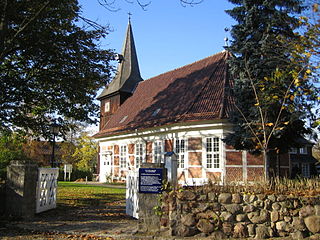
Geesthacht is the largest city in the District of the Duchy of Lauenburg in Schleswig-Holstein in Northern Germany, 34 kilometres (21 mi) south-east of Hamburg on the right bank of the River Elbe.
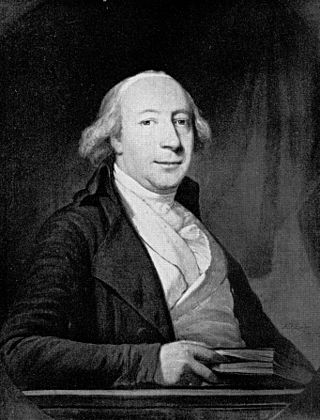
Georg Heinrich Sieveking was a German merchant and follower of the Enlightenment. Together with his friend and business partner, Caspar Voght, he led one of the largest trading firms in the Hanseatic League during the second half of the 18th century. On 14 July 1790, the first anniversary of the Storming of the Bastille, a freedom celebration organized by Sieveking occurred in Harvestehude, a neighborhood of Hamburg, which received attention far beyond the city. In 1796, a few years before his death, Sieveking succeeded in abolishing the 1793 Hamburg-imposed Embargoes against Paris.

Caspar Voght, later Caspar Reichsfreiherr von Voght, was a German merchant and social reformer from Hamburg. Together with his business partner and friend Georg Heinrich Sieveking he led one of the largest trading firms in Hamburg during the second half of the 18th Century. On numerous trade trips, he completely crossed the European continent. One of his greatest achievements was reforming the welfare system of Hamburg. From 1785 he dedicated himself to strengthening agricultural and horticultural projects and built a model agricultural community in Flottbek, close to the gates of Hamburg.

The first Battle of Heligoland took place on 4 June 1849 during the First Schleswig War and pitted the fledgling Reichsflotte against the Royal Danish Navy, which had blocked German naval trade in North Sea and Baltic Sea since early 1848. The outcome was inconclusive, with no casualties, and the blockade went on. It remained the only battle of the German fleet.

Johannes Classen was a German educator and classical philologist.

The Hanseaten is a collective term for the hierarchy group consisting of elite individuals and families of prestigious rank who constituted the ruling class of the free imperial city of Hamburg, conjointly with the equal First Families of the free imperial cities of Bremen and Lübeck. The members of these First Families were the persons in possession of hereditary grand burghership of these cities, including the mayors, the senators, joint diplomats and the senior pastors. Hanseaten refers specifically to the ruling families of Hamburg, Lübeck and Bremen, but more broadly, this group is also referred to as patricians along with similar social groups elsewhere in continental Europe.
Gottlob Friedrich Walter Agathon Wunderlich was a German jurist and a member of the Oberappellationsgericht der vier Freien Städte.
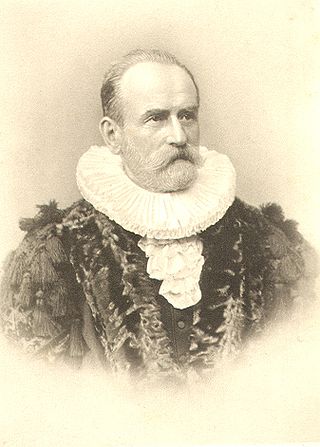
Johannes Georg Andreas Versmann was a German lawyer and politician. He was the first president of the new Bürgerschaft of Hamburg in 1859 and dominated the politics of the Hanseatic state as first or second mayor between 1887 and 1899.
Christian Heinrich Postel was a German jurist, epic poet and opera librettist, who wrote 28 libretti for the Oper am Gänsemarkt in Hamburg: set by composers such as Johann Philipp Förtsch, Reinhard Keiser and Georg Philipp Telemann. His texts for a St John Passion were set by composers Christian Ritter, Johann Mattheson and Johann Sebastian Bach in their respective St John Passion.
The following is a timeline of the history of the city of Hamburg, Germany.

Amalie Wilhelmine Sieveking was a German philanthropist and social activist who founded the Weiblicher Verein für Armen- und Krankenpflege. She initiated employment and practical training for the poor, and promoted the building of affordable housing and hospitals. She is regarded as a forerunner of modern German social work.
Edward Bartels Banks was a lawyer who became a politician and a member of the newly established Reichstag in 1871. His great grandfather, William Banks, was an English merchant who had relocated to Hamburg.
The accession of the city state of Hamburg to the German Customs Union, commonly known as Zollverein, in 1888 was the culmination of a project for the economic and monetary union of Germany, stretching back to 1819. In that year Schwarzburg-Sondershausen joined Prussia’s internal customs union, the first other state to do so and the first of many to follow.
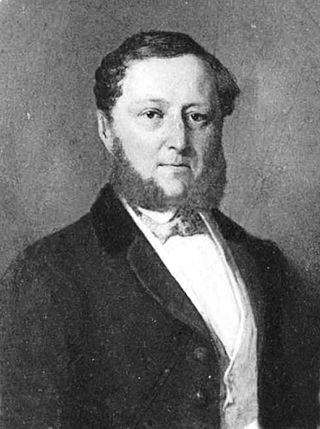
Carl Hermann Merck was one of the leading Hamburg statesmen of the 19th century, holding the office of Syndicus from 1847 until his death in 1880.
Emil Karl Heinrich von Richthofen, was a Prussian baron (freiherr) and diplomat. He was the son of Ludwig Philipp Heinrich, Freiherr von Richthofen (1770–1850).

Edward Banks was one of the leading figures of the Free City of Hamburg in the mid 19th century, holding the office of Syndicus from 1837 until his death in 1851. His family was of English origin, having emigrated around 1660.
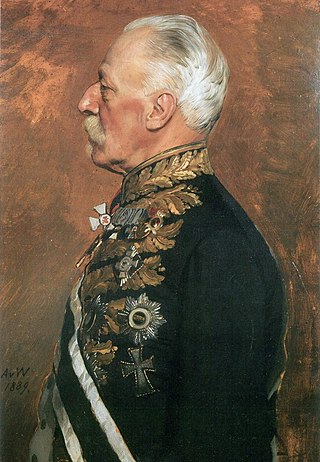
Daniel Christian Friedrich Krüger was a diplomat in the service of the city state of Lübeck and also jointly of the Hanseatic cities of Lübeck, Hamburg and Bremen. He was born in Lübeck on 22 September 1819 and died in Berlin on 17 January 1896.
Eduard Ebel was a German Protestant pastor, superintendent and poet. He became known above all as the author of the still popular winter song Leise rieselt der Schnee, whose text he published in 1895 under the title Weihnachtsgruß.














